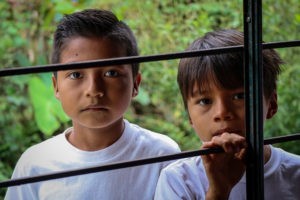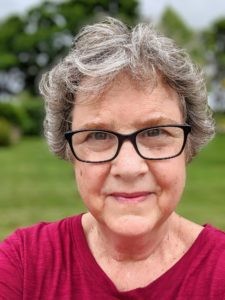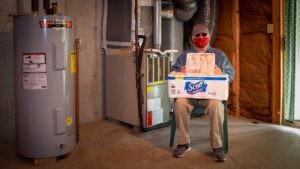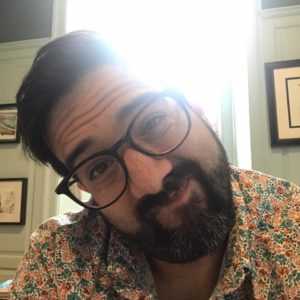As a minister, Brent Newberry always strives to discern congregational talents and how they can be used to bring healing and hope to a turbulent, virus-ridden world.

Exhibit photo of children unable to enter a classroom filled to capacity. (Photo/Betsy Lambert)
“I am recognizing that whatever you’re good at as a church is accentuated in a stressful situation,” said Newberry, pastor of First Baptist Church of Worcester, Mass. And so in the current pandemic, “I’ve been trying to figure out what we’re good at and apply that.”
One answer has been photography — specifically the church’s photography group and its members’ calling to nurture fellowship and faith through still images.
The most recent expression of that ministry was an online photo exhibit titled “Widen the Lens,” which features more than 60 images chosen to reflect the COVID-19 pandemic, social justice history and the Black Lives Matter movement for racial justice.
Images were selected from existing collections because photography group members continue to shelter in place. Yet the exhibit managed to be relevant to First Baptist’s active support of social justice causes.
“We are working on anti-racism engagement as a congregation, and the arts is prophetic witness to that. It’s a form of protest,” Newberry said.

Karen Brockney
It’s also a form of ministry.
“For me as a photographer, this is a way to contribute to my church community and to express my faith, my hopes and my understanding of what I see,” said Karen Brockney, a photography group member and ordained United Church of Christ minister who has belonged to First Baptist 15 years. “It’s a way to help people experience hope and joy.”
That’s also the case for the “Widen the Lens” exhibit, she explained.
The current project follows a May project, titled “Surprise! A Virtual Photo Show,” intended to boost viewers’ spirits with nature, wildlife, pet and children’s images, among others.
“We seek to widen our lenses to see the big picture around us — and capture the tiny details that really matter.”
The dozen-member group was preparing a follow-on exhibit themed as “Summer Dreams” when George Floyd was killed by a Minneapolis police officer, sparking nationwide protests.
“Everyone started talking about how to become an anti-racist at that time, and ‘Summer Dreams’ at that point became irrelevant,” Brockney said. Group members sorted through hard-drives for images to create a project reflecting their own — and First Baptist’s — social justice concerns.
“We have become sometimes painfully aware that our perspective and focus shapes what we see and share,” the introduction to the exhibit states. “We seek to widen our lenses to see the big picture around us — and capture the tiny details that really matter.”

An image titled “Signs of the Times.” (Photo/Karen Brockney)
The group notes that cameras witness both beauty and injustice: “We share with you images from our collections that speak to us today. Even though we may be sticking close to home, our photos travel the world.”
Sections of the exhibit include “Coronavirus Chronicles,” “Focus on Freedom and Justice,” “Walls and Fences” and “Hope and Change.”
The photography group, which staged physical photo exhibits at the church and documented worship services pre-pandemic, developed “Widen the Lens” from weeks of Zoom discussions, Brockney said. “We asked ourselves, what is our role in being able to show our faith and our support for the movement of racial justice and equity?”
The First Baptist photographers weren’t asked to create the exhibit, which made it all the more powerful, Newberry said. “It was deeply profound to hear that they had been discussing this.”
The group was created in 2018 when First Baptist was encouraging the formation of small groups around areas of interest within the congregation, including painting, game night, trivia and pub theology.

Brent Newberry
The church also is rich in the performance arts, having many professional vocalists and musicians within the congregation. Newberry said “Widen the Lens” has him brainstorming how these other gifts might be harnessed to help people through the pandemic and communicate about justice.
With in-person gatherings suspended at the church, Newberry said he lost sight of that potential. “One thing I had forgotten about in this pandemic was that the arts is a big piece of our church. It’s in our DNA. It’s something we are good at and want to share.
“All of a sudden, new possibilities start opening up to offer hope or beauty in the midst of anxiety and pain and injustice,” he said. “This photography exhibit has widened my lens about how we as a church might make a broader impact.”


